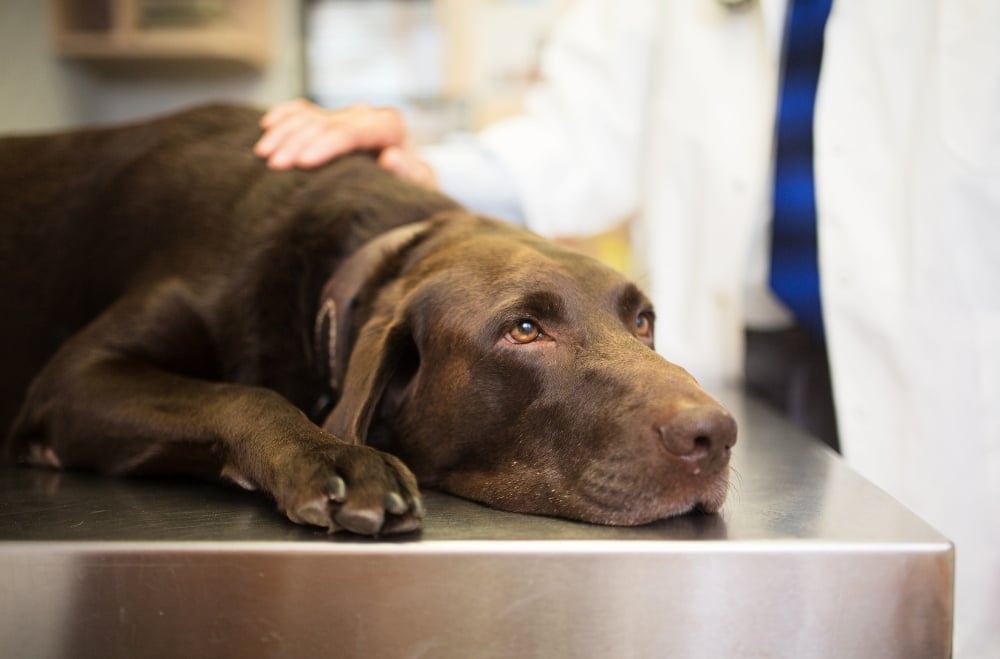Key Takeaways
- Worm parasites are common and can be fatal.
- There are no vaccines available for roundworms or hookworms.
- Worms can be caused by ingesting eggs from contaminated waste, vomit, or food.
- Diagnosing worms requires a stool sample from your pet.
- Keep pet areas clean to prevent worms, and watch puppies closely for behavior changes.
Table of Contents
Intestinal parasites like hookworms and roundworms are common and sometimes fatal conditions that can affect puppies whose immune systems aren’t fully formed yet. There are no vaccines available for hookworms or roundworms, so helping a pup with either parasite requires a keen eye to spot symptoms and then a trip to the vet: de-worming medications are necessary and you cannot eradicate it with an at-home treatment. If left untreated, these parasitic worms can cause death due to complications like malnutrition and anemia. With young dogs, it’s extremely important to watch for signs of infection and treat any cases as quickly as possible.
Causes
Puppies can also contract the worms by ingesting the eggs from contaminated food, water, vomit, or feces. Furthermore, both types of parasitic worms can be passed from an infected mother to her pups, either in utero or through nursing, and will reinfect the mother as well. Hookworm larvae may also penetrate an animal’s skin, infecting it. Entire litters of puppies can become infected with hookworms and roundworms if they are living in cramped conditions.
Symptoms
Hookworm symptoms include:
- A malnourished appearance
- Poor eating habits
- Nostrils, ears, and lips may appear pale
- Stools could be dark or “tarry” or diarrhea and constipation will be present
- If the parasite has migrated into the lungs, a hacking cough will be present.
Roundworm infections manifest as a variety of symptoms:
- Lethargy
- Anorexia
- Colic
- Abdominal swelling
- Vomiting
- Abnormal feces
- When roundworm larvae have infected the lungs, the dog may exhibit a hacking cough.
Diagnosis and treatment
Your vet will require a detailed description of your dog’s symptoms, including onset, frequency, and any abnormalities in behavior or stool. A physical exam will take place to search for symptoms like abdominal swelling and pale membranes. Bring a sample of your dog’s stool to your appointment; dead parasites are usually passed out in fecal matter, and tests will be performed as well.
Deworming medications will be prescribed, depending on the type of parasite. You may need to provide your puppy with additional nutritional supplements, depending on the severity of the infection. Rarely, puppies may require hospitalization for severe hookworm infections; this treatment entails oxygen and fluid therapies. In extreme cases of roundworm infestation, surgery will be needed to remove the worms.
Management and prevention
Parasites are dangerous to young animals, and tricky to eliminate, as larvae must be destroyed as well as adult worms. You’ll be need to do the following:
- Continue to check in with your vet to determine if the treatment is working.
- Thoroughly wash and bleach all food and water bowls and any areas the puppies encountered.
- If you have a pregnant dog, keeping birthing areas clean; this can greatly reduce the puppies’ chances of contracting the parasites.
- Avoid having standing water near young puppies, as hookworms tend to lay their eggs near it.
Remember there is no vaccine, so it’s up to you to keep pets safe and their environment as clean as you can manage. Should they fall prey to a parasite, get them to a vet as quickly as possible. Watch young puppies closely for any changes in feeding and bathroom habits; quick treatment can save a dog’s life.
The content is not intended to be a substitute for professional veterinarian advice, diagnosis, or treatment. Always seek the advice of your veterinarian or other qualified health provider with any questions you may have regarding a medical diagnosis, condition, or treatment options.







